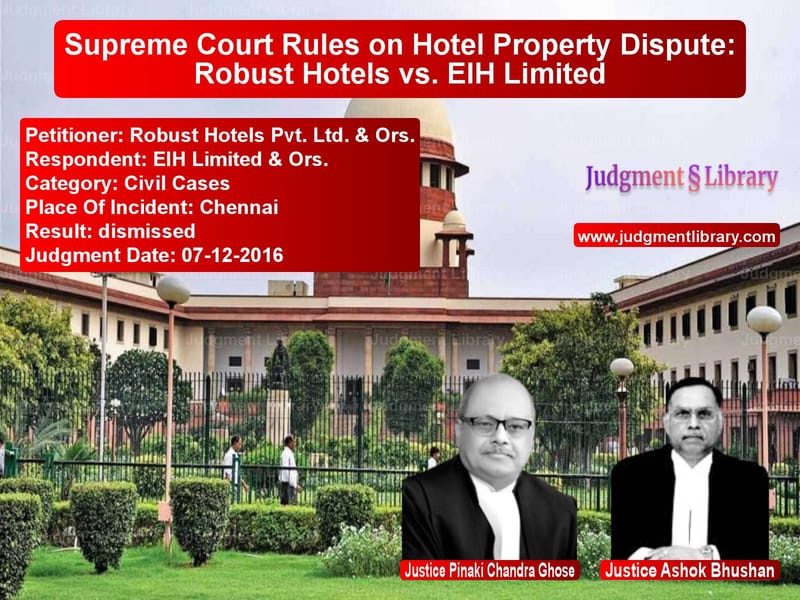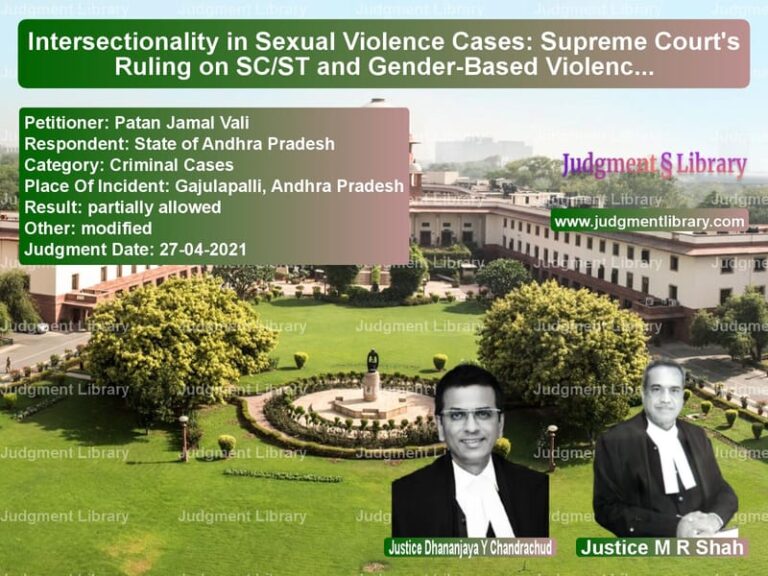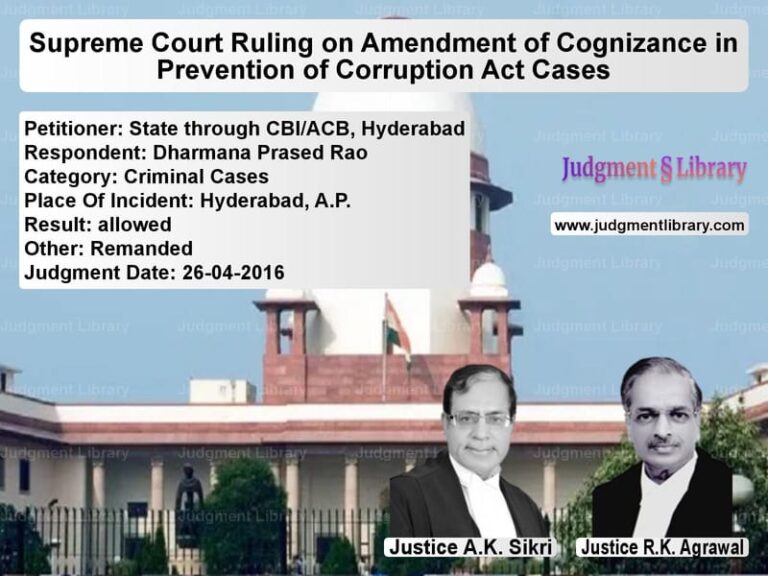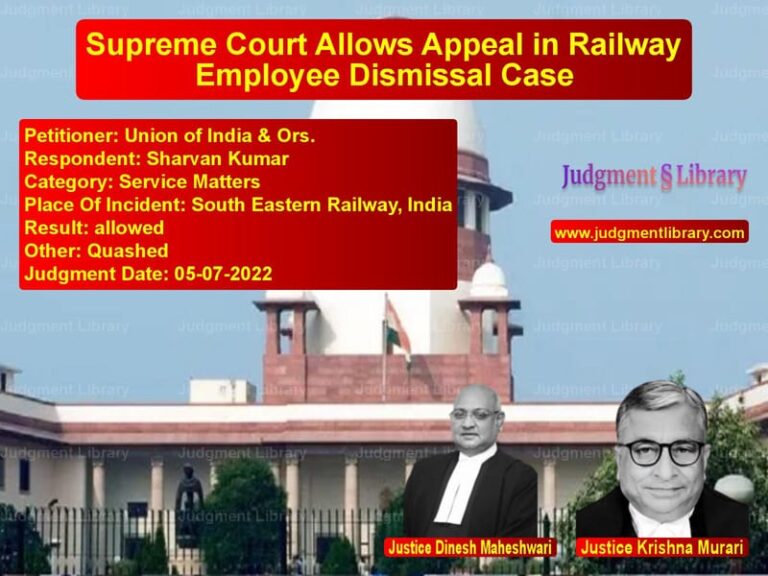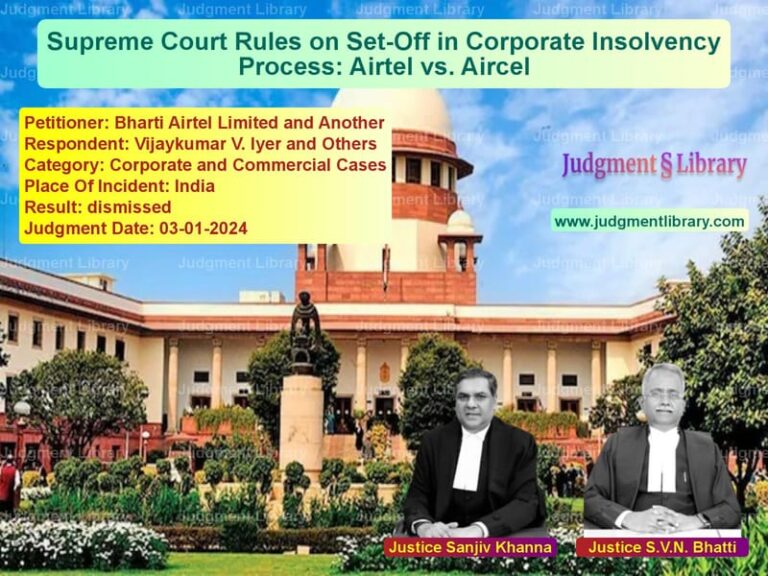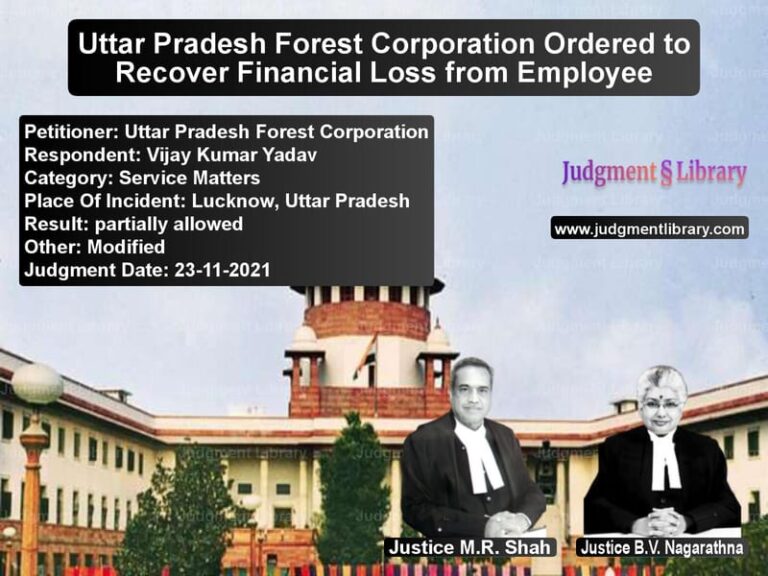Supreme Court Rules on Hotel Property Dispute: Robust Hotels vs. EIH Limited
Property disputes in commercial real estate often lead to prolonged legal battles, especially when multiple parties claim ownership or management rights. The case of Robust Hotels Pvt. Ltd. & Ors. vs. EIH Limited & Ors., decided by the Supreme Court on December 7, 2016, revolved around the ownership and management rights of a luxury hotel in Chennai. The dispute centered on whether an auction purchaser of a hotel property had overriding rights over prior contractual obligations entered by the previous owner.
Background of the Case
The case stemmed from financial difficulties faced by Balaji Hotels & Enterprises Ltd. (BHEL), which had entered into agreements with EIH Limited (owners of the Oberoi hotel chain) for managing and operating a luxury hotel in Chennai. BHEL secured loans from financial institutions such as IFCI Ltd. and Tourism Finance Corporation of India Ltd. (TFCI) to finance the project. However, when BHEL defaulted on its financial obligations, its lenders initiated proceedings under the Securitisation and Reconstruction of Financial Assets and Enforcement of Security Interest (SARFAESI) Act, 2002.
Following the auction of the property under the SARFAESI Act, the property was acquired by Robust Hotels Pvt. Ltd.. However, EIH Limited contested the auction, arguing that its agreements with BHEL granted it exclusive rights to operate and manage the hotel. EIH sought legal intervention to enforce its management rights over the property.
Legal Issues in Question
- Whether EIH Limited’s management agreements with BHEL were legally binding on the auction purchaser (Robust Hotels).
- Whether secured creditors’ rights under the SARFAESI Act override prior contractual agreements between the borrower (BHEL) and third parties.
- Whether Robust Hotels, having lawfully acquired the property through auction, could operate the hotel without interference from EIH.
Petitioners’ (Robust Hotels) Arguments
- Robust Hotels acquired the hotel property lawfully through the SARFAESI Act, and its ownership rights could not be challenged.
- EIH Limited’s agreements with BHEL were rendered void due to the financial default and subsequent auction.
- The financial institutions had the legal right to enforce their security interests, overriding prior management agreements.
- The SARFAESI Act provides absolute ownership rights to auction purchasers, free from past encumbrances.
- EIH Limited’s legal challenge was an attempt to disrupt the legitimate operations of the new owner.
Respondents’ (EIH Limited) Arguments
- EIH Limited contended that its agreements with BHEL granted it exclusive rights to operate and manage the hotel.
- Even though BHEL defaulted on its financial obligations, the new owner (Robust Hotels) should have honored the pre-existing management contracts.
- The SARFAESI Act proceedings did not extinguish contractual obligations that BHEL had entered into prior to defaulting.
- Since EIH had invested substantial financial resources into the project, its rights should be legally protected.
Supreme Court’s Judgment
The Supreme Court, comprising Justice Pinaki Chandra Ghose and Justice Ashok Bhushan, ruled in favor of Robust Hotels, making the following key observations:
- The financial institutions had the legal right to auction the property under the SARFAESI Act due to BHEL’s loan default.
- EIH Limited’s agreements with BHEL did not override the statutory rights of secured creditors.
- Robust Hotels, having lawfully acquired the property, had the absolute right to operate the hotel without being bound by past agreements.
- EIH Limited’s claim of continued management rights could not be enforced after the property changed ownership.
- The transfer of ownership was valid, and EIH could not challenge it based on prior contracts.
The Supreme Court dismissed EIH’s appeal and upheld Robust Hotels’ ownership rights, allowing them to proceed with hotel operations without interference.
Key Legal Takeaways
- Secured Creditors’ Rights: Banks and financial institutions can enforce security interests under the SARFAESI Act, overriding prior agreements.
- Legality of Property Auctions: Once a property is auctioned under a valid legal process, previous agreements do not affect the buyer’s ownership rights.
- Priority of Financial Interests: Commercial contracts do not supersede secured loan obligations.
- Business Continuity: Buyers of auctioned properties receive legal protection to continue business operations.
Implications of the Judgment
This ruling has far-reaching consequences for the commercial real estate sector and financial institutions:
- It strengthens the rights of secured creditors, ensuring that borrowers cannot evade their financial obligations through third-party agreements.
- It provides legal certainty for auction purchasers, protecting them from past encumbrances.
- It highlights the importance of conducting due diligence before entering into long-term management agreements with financially unstable entities.
Conclusion
The Supreme Court’s ruling in Robust Hotels vs. EIH Limited reaffirms the principle that secured creditors have priority over contractual claims when enforcing recovery under the SARFAESI Act. This judgment serves as a critical precedent for commercial property disputes and emphasizes the importance of financial compliance for businesses operating in high-value real estate ventures.
Don’t miss out on the full details! Download the complete judgment in PDF format below and gain valuable insights instantly!
Download Judgment: Robust Hotels Pvt. L vs EIH Limited & Ors. Supreme Court of India Judgment Dated 07-12-2016.pdf
Direct Downlaod Judgment: Direct downlaod this Judgment
See all petitions in Property Disputes
See all petitions in Judgment by Pinaki Chandra Ghose
See all petitions in Judgment by Ashok Bhushan
See all petitions in dismissed
See all petitions in supreme court of India judgments December 2016
See all petitions in 2016 judgments
See all posts in Civil Cases Category
See all allowed petitions in Civil Cases Category
See all Dismissed petitions in Civil Cases Category
See all partially allowed petitions in Civil Cases Category

